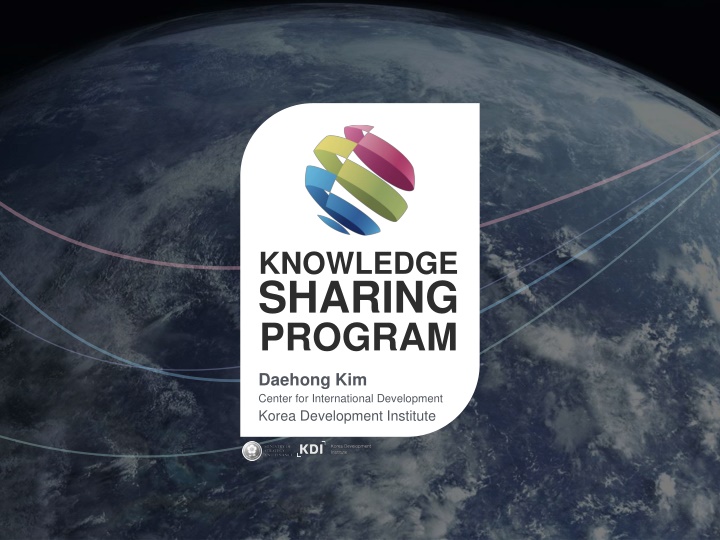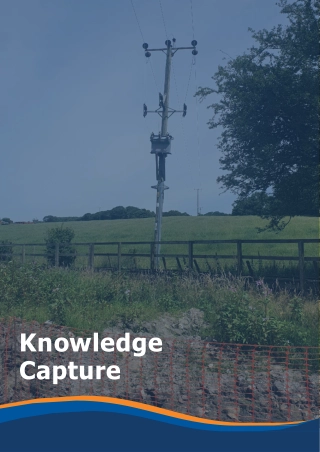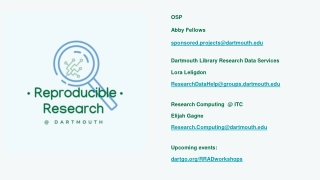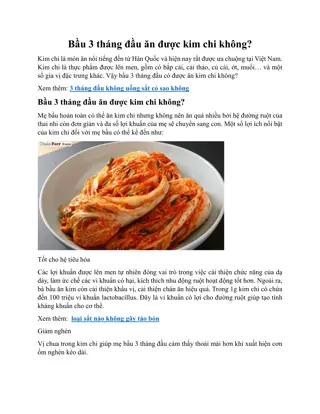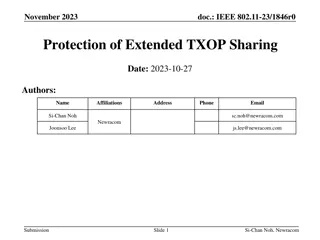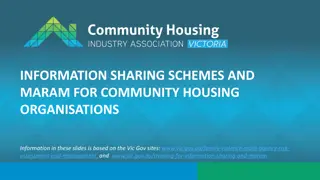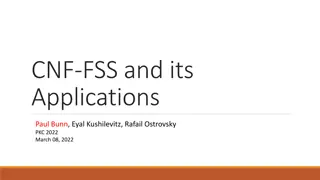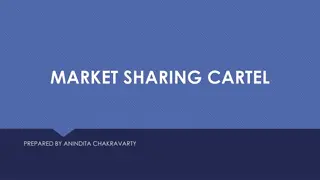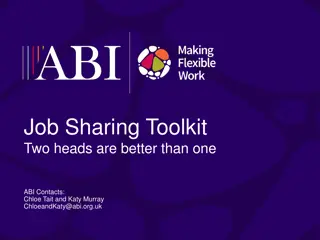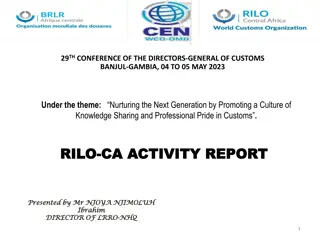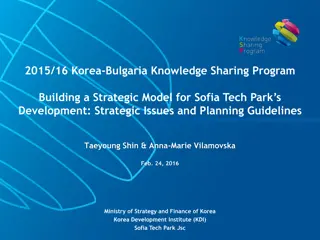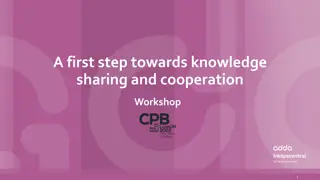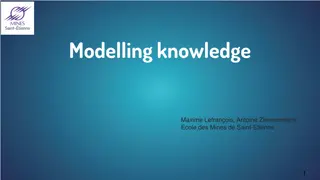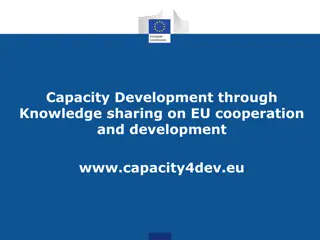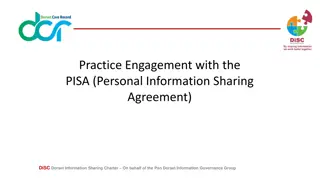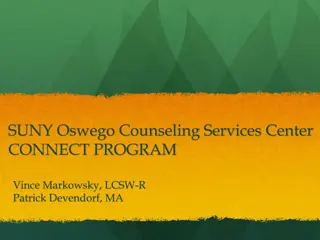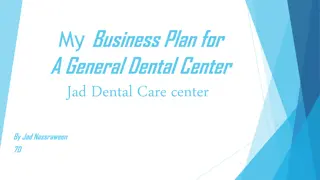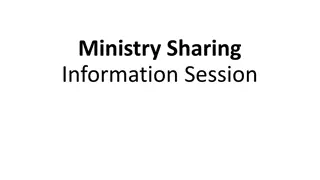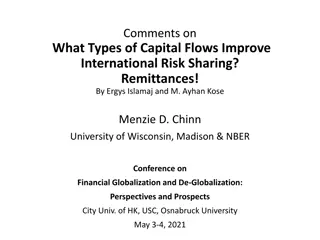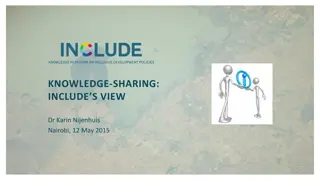Knowledge Sharing Program at Daehong Kim Center
The Knowledge Sharing Program (KSP) at the Daehong Kim Center for International Development at the Korea Development Institute aims to share Korea's unique development experiences with partner countries, enhancing policymaker capacities and confidence. The program emphasizes seeking solutions together, sharing successes and failures, and promoting knowledge-driven development through three pillars: Think Tank, Policy Consultation, and Modularization.
Download Presentation

Please find below an Image/Link to download the presentation.
The content on the website is provided AS IS for your information and personal use only. It may not be sold, licensed, or shared on other websites without obtaining consent from the author.If you encounter any issues during the download, it is possible that the publisher has removed the file from their server.
You are allowed to download the files provided on this website for personal or commercial use, subject to the condition that they are used lawfully. All files are the property of their respective owners.
The content on the website is provided AS IS for your information and personal use only. It may not be sold, licensed, or shared on other websites without obtaining consent from the author.
E N D
Presentation Transcript
KNOWLEDGE SHARING PROGRAM Daehong Kim Center for International Development Korea Development Institute 1
CONTENTS What is KSP? Policy Consultation I. II. 2
Knowledge Sharing Program What is KSP? Center for International Development at KDI
Background KOREA s Unique Development Experience 2013 $ 25,977 GDP per capita KOREA, THE FIRST TO TURN DONOR FROM PECIPIENT 2008 Global Financial Crisis 1996 OECD Member $ 79 per capita national income 1997 Asia Financial Crisis 1987 1961 Military Coup 1950 Korean War1953 Democratization 4 4
Background Emphasis on Knowledge for Development Increasing importance of knowledge and experience in development Growing demand from developing countries for policy directions, alternatives, action plan, in addition to loans or technical assistance e.g. Knowledge Sharing Alliance (OECD), Knowledge Hubs(WB) Shares Korea s Experiences 5
What is KSP? KSP, Innovating Beyond ODA. KSP is Knowledge-driven economic cooperation program designed to share Korea s development experiences with the partner countries policymakers, enhancing their capacities and confidence. What makes KSP different?? Typical ODA: Providing the Resources for Development Shares Korea s Experiences Customized Financial Aid Technical Support Capacity Building Knowledge- based Comprehensive Infrastructure 6
OBJECTIVE OF KSP Seeking Solutions Together Sharing Successes and Failures Enhancing Policy-making Capabilities Nurturing Mutually Beneficial Relationships Providing Applicable Policy Recommendations Promoting Knowledge- Driven Development 7
KSP Structure: Three Pillars of KSP Think Think- -Tank Ranking Ranking Tank 1stin Asia (2015 Global Go To Think Tank Rankings, Univ. of Pennsylvania) POLICY CONSULTATION Center for International Development at KDI Comprehensive policy consultation program based on joint research of Korean consultants and local consultants MODULARIZATION Systematic documentation of Korea s development experience for effective knowledge sharing Korea EXIM Bank JOINT CONSULTING Connects lessons of Korea s development experience with IO s consulting experience for joint technical assistance & cooperation projects 8
Bilateral KSP POLICY CONSULTATION Center for International Development at KDI
KSP Policy Consultation Areas Knowledge-based Economy SMEs Infrastructure Development Economic crisis Management Human resources Development Financial Services Industrialization, Export Promotion E-goc&ICT Development Socioeconomic Development Strategy Energy & Green growth Agriculture Development 10
Characteristics of Policy Consultation Encompasses policy consultation, research, and capacity building programs Provides concrete policy solutions to tackle the challenges faced by partenr countries POLICY-ORIENTED 02 INTEGRATED 04 03 PARTICIPATION-ORIENTED 01 DEMAND-DRIVEN Project topics are selected based on the needs and policy demand of partner countries Wide range of participants to ensure ownership and quality of policy consultation 11
Implementation cycle of Consultation 1. Submission of KSP Demand Survey Form 5. Senior Policy Dialogue & Final Reporting Workshop 2. High Level Demand Survey & Pilot Study 4. Interim Reporting & Policy Practitioners' Workshop 3. Additional Pilot Study 12
Achievements since 2004 Since 2004, we have been working with 55 partner countries from all over the world on more than 861 policy consulting topics* 861 55 Partner Countries Cooperative Projects 861 746 in 606 462 323 215 136 81 53 31 21 11 2004 2005 2006 2007 2008 2009 2010 2011 2012 2013 2014 2015 *(Cumulative) * Partner countries of Bilateral KSP policy consultation 13
KSP in Europe and Central Asia Partner 2004 2005 2006 2007 2008 2009 2010 2011 2012 2013 2014 2015 Total 2 Bulgaria 3 Hungary 3 Romania 1 Russia Europe 6 Turkey 2 Ukraine Visegrad Group* 1 4 Azerbaijan 7 Kazakhstan Central Asia 2 Kyrgyzstan 8 Uzbekistan Total 1 1 0 1 3 3 3 2 4 6 7 8 38 *Multilateral KSP 14
2015/16 KSP Partner Countries Latin America & Caribbean Africa & Middle East Europe & Central Asia Asia Colombia Algeria Cambodia Bulgaria Costa Rica Ethiopia Indonesia Hungary El Salvador Kuwait Laos Kazakhstan Guatemala Saudi Arabia Myanmar Kyrgyzstan Honduras Tanzania Vietnam Romania Mexico Turkey Nicaragua Uzbekistan Visegrad group 7 Countries 5 Countries 5 Countries 8 Countries TOTAL : 25 Countries 15
THANK YOU dhkim@kdi.re.kr +82-44-550-4423 http://www.ksp.go.kr 16
